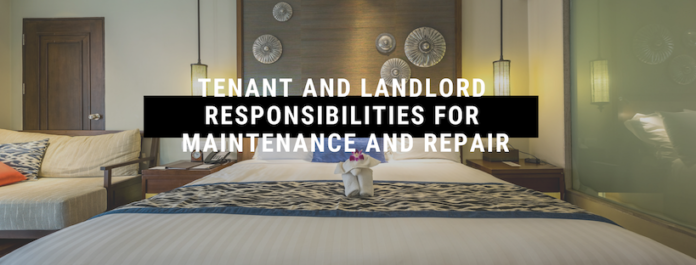Landlord and tenant law has been around since the medieval era when lords of the land would own large estates. They would allow serfs to build and maintain homes on the property. From this point on most landlord/tenant agreements were heavy in favor of the landlord. This can easily be seen from a case in 1863 in New York. An apartment building burned down and the court made the tenant continue to pay rent on their lost upper story apartment.
It wasn’t until the 1960’s that rental law really evolved into an entity in itself. Up until this point, it was a mash-up of contract and property law. Today, landlord responsibilities get dictated by local and state laws. This helps landlords retain great tenants is by maintaining the property.
But what are you responsible for as the landlord? We have created a starter guide to help you determine what you and your tenant are responsible for.
Landlord Responsibilities Vary from State to State
Please note that in this article we are going to discuss landlords’ responsibilities in general terms. However, each state has specific laws that give both landlords and tenants responsibilities and rights.
There are some states that are known for favoring landlords. These states have laws that allow landlords more freedom when it comes to rental agreements and their terms. For example, Florida doesn’t require landlords to put the rental agreement in writing.
One thing all states do have in common is that they need to provide a safe living environment for their tenants.
Landlord Responsibility
In the most basic terms, landlords must provide a safe living environment that complies with all of the local building codes. Landlords are generally responsible for maintaining the structure of the building.
Making the Property Habitable
What makes the property habitable? Well, this means maintaining the plumbing, heat, major appliances, and the structure of the building. All of these things need to be taken care of before the tenant actually moves in. Then the landlord needs to make any necessary repairs while the tenant lives at the property.
Common Areas
If the property has more than one unit the landlord is always responsible for maintaining the common areas of the property. This means providing trash receptacles, maintain elevators and keep the whole area safe and clean. Common areas also include the gym or pool if these are on the property.
Pest Control
Landlords must take action to ensure that the property doesn’t become pest infested. This usually means hiring a professional to come and spray the property.
Time Limits for Repair
Many states impose deadlines on certain types of repairs. Repairs that are vital for inhabiting a property must get addressed within 24 hours. These types of repairs would include things like plumbing, electricity, and heat in winter. These are repairs that if neglected make it impossible for the tenant to use the property.
Repairs that are not so vital have longer deadlines. This could vary from 2 to 10 days depending on the law of that state.
Can’t Contract Your Responsibilities Away
Some landlords have tried to adjust their responsibilities by contracting them away. The lease would state that the tenant was responsible for things that the landlord should do. These agreements are ineffective and the court won’t enforce them. As the landlord, you will then be held liable for any maintenance that hasn’t been done.
Must Give the Tenant Notice
You need to let the tenant know when you intend to enter the property to make repairs. State laws vary on the notice but it is usually between 24 and 48 hours. This doesn’t apply to emergency repairs though. An emergency would be something like a pipe leaking and actively flooding the home. Make sure you comply with the notification laws. If you don’t you may be subject to a lawsuit from your tenant.
Tenant Responsibility
In basic terms, tenants have a responsibility to not damage or destroy the property they are living in. The tenant also has a responsibility to let the landlord know about any needed repairs.
Tenant Caused Damage
When the tenant causes damage to the property, they are responsible for getting it repaired. This includes things like damaged carpets, holes in walls, or a broken window.
The Yard
This is one area where a landlord and tenant can create their own agreement over who is responsible for care. The tenant may have to do all of the maintenance, or none, or a customized duties agreement. One catch is that the landlord will be held responsible if the yard is not maintained and starts to violate local laws.
The Trash
While a landlord can’t require tenants to have a perfectly clean home, you can include waste management in the lease. This means the tenant must dispose of their trash properly.
Common Areas
While the landlord must maintain these areas, it is the tenant’s responsibility to follow the rules. Tenants can’t expect the landlord to effectively maintain the property if the tenants regularly damage or misuse the facilities.
Pest Control
While the landlord must keep the property pest free, the tenant must contribute to this effort by keeping the property clean. If the landlord finds that an infestation is the result of the tenant’s actions, they can charge the tenant for extermination efforts.
Water, Electric, and HVAC
The tenant needs to use these utilities in a proper manner as to not cause damage to them. They also need to let the landlord know in the event that they do break so that further damage can be prevented.
Tenants can’t let a broken pipe leaking water go ignored and then claim the place is uninhabitable. If the landlord discovers that the broken pipe is a direct result of the tenant’s actions, then they can charge the tenant for the repair.
Landlords can also have the lease state that the tenant is responsible for basic maintenance. This could include things like changing out the air filter in the air conditioning system.
Smoke Detectors and Fire Alarms
While the landlord needs to make sure the property has smoke detectors, it is the tenant who must make sure they work. They do this by replacing the batteries and regularly testing the system.
Consequences for Not Making Repairs
The court wants to make sure that both parties follow the law when it comes to maintaining the property. Because of this, there are consequences for not making repairs.
Landlord
When a landlord refuses to make repairs that are necessary a tenant may choose to withhold rent. The laws for this vary greatly so be sure to check your local laws.
Withheld Rent
Some states allow a tenant to withhold the entire rent, others only a portion that is in direct relation to the size of the repair. Many states say that the tenant doesn’t have to pay the landlord, but does have to put the rent money into an escrow account.
Other states require that the tenant inform the landlord of their intention to withhold the rent in writing. The tenant also has the option of hiring someone themselves to make the necessary repair.
The cost of hiring the third party will then get deducted from their rent. This means that the landlord doesn’t get a say in who does the work.
Code Violations
If the lack of repairs are making the building violate local health codes the tenant has the right to call authorities. Now you have inspectors looking at your property.
You may end up having to make the repairs and pay fees and penalties.
Lawsuit
If the problem is really bad the tenant can choose to simply end the lease agreement and leave the property. Now you are going to face a constructive eviction lawsuit.
Tenant
If a tenant doesn’t do their duty to maintain the property, then the landlord has the right to keep the security deposit. Liability doesn’t end there though. If the damage is greater than the security deposit the landlord can go after the tenant for the total cost of the repair.
Eviction
Eviction laws vary greatly from state to state so before you take any action, be sure to check your local laws before taking any action. Many states let a landlord evict a tenant who actively damages a property. To do this though, you need to follow the court process. Otherwise, the landlord can get in trouble for illegally evicting the tenant.
Hold Your Landlord Responsible
If you plan to manage rental property and become a landlord you need to be aware of your landlord responsibilities. Otherwise, you may find yourself in trouble with the courts. Make sure that your property is ready for inhabitants before the tenant moves in. Then actively maintain the property throughout the lease term.
Make sure that your lease clearly defines who is responsible for what. You also need to make sure that your defined responsibilities do not violate any laws.




















